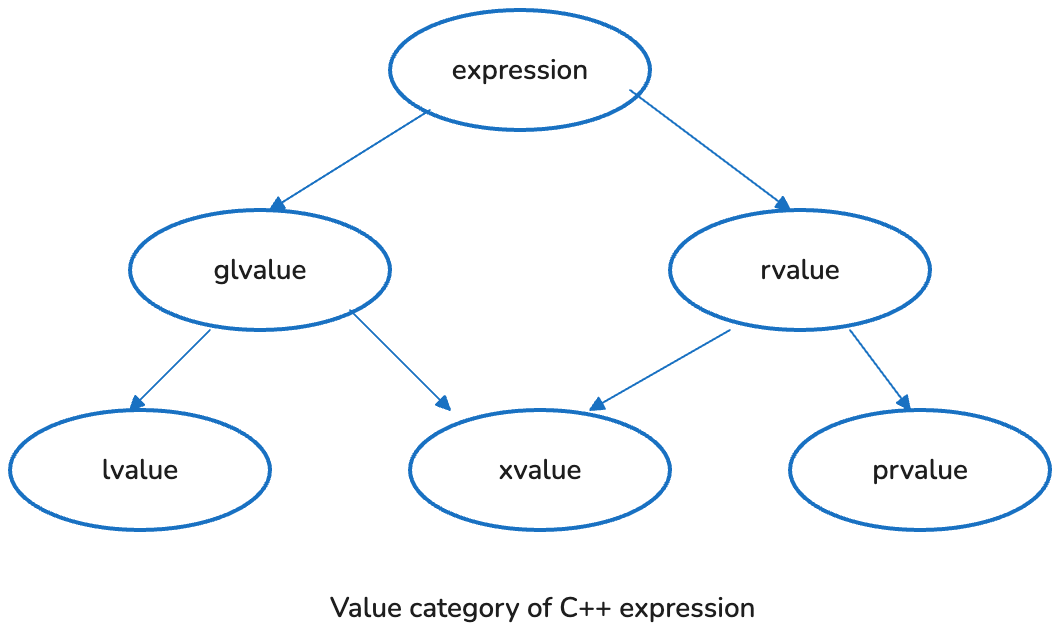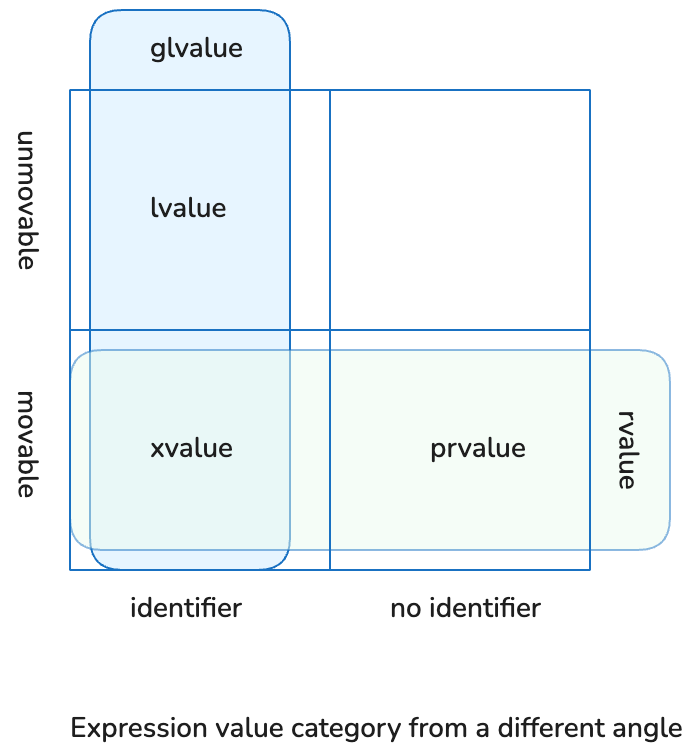Value Categories
We often say that in C++, there are lvalues and rvalues. But that’s not entirely accurate. The C++ standard defines value categories more precisely:

Let’s first try to understand these terms literally:
- An lvalue is an expression that can usually appear on the left-hand side of an assignment.
- An rvalue is an expression that can usually only appear on the right-hand side of an assignment.
- A glvalue is a generalized lvalue.
- An xvalue is an expiring value.
- A prvalue is a pure rvalue.
Still confusing, right? For now, let’s focus only on lvalues and prvalues.
An lvalue is an expression that has an identifier and can have its address taken. The most common examples are:
- The name of a variable, function, or class member
- Expressions that return an lvalue reference, such as
++x,x = 1, orcout << ' ' - String literals like
"hello world"
When calling functions, an lvalue can bind to a parameter of lvalue reference type (e.g., T&). Constants can only bind to const lvalue references (const T&).
On the other hand, a prvalue is an expression that has no identifier and whose address cannot be taken; we often call these “temporary objects.” The most common examples are:
- Expressions that return by value (non-reference), such as
x++,x + 1, ormake_shared<int>(42) - Literals (except string literals), like
42,true, etc.
Before C++11, rvalues could bind to const lvalue references (const T&) but not to non-const lvalue references (T&). Starting with C++11, the language introduced rvalue references: T&&. Like lvalue references, rvalue references can also be modified by const and volatile, but typically we don’t use those qualifiers for rvalue references.
Introducing rvalue references adds some complexity to the language but also opens up many optimization opportunities. Since C++ supports function overloading, we can overload functions based on different reference types to implement different behaviors. For example, earlier we used overloads to allow the smart_ptr constructor to behave differently:
template <typename U>
smart_ptr(const smart_ptr<U>& other) noexcept {
ptr_ = other.ptr_;
if (ptr_) {
other.shared_count_->add_count();
shared_count_ = other.shared_count_;
}
}
template <typename U>
smart_ptr(smart_ptr<U>&& other) noexcept {
ptr_ = other.ptr_;
if (ptr_) {
shared_count_ = other.shared_count_;
other.ptr_ = nullptr;
}
}
You may wonder: is the parameter other in the second overload (the one with rvalue reference) an lvalue or rvalue?
By definition, other is a variable name — it has an identifier and an address — so it’s still an lvalue, even though its type is an rvalue reference.
In particular, when you pass other to another function, it will match overloads for lvalue references. In other words:
A variable of rvalue reference type is still an lvalue.
This may feel counterintuitive, but it’s consistent with C++. After all, you can take the address of an rvalue reference variable, just like with any lvalue. We’ll return to this point later.
Now consider this code:
smart_ptr<shape> ptr1{new circle()};
smart_ptr<shape> ptr2 = std::move(ptr1);
In the first expression, new circle() is a prvalue. But since we typically pass pointers by value, we don’t really care whether it’s an lvalue or rvalue.
The second expression is more interesting. std::move(ptr1) forcibly converts an lvalue reference into an rvalue reference without modifying its contents. In practical terms, std::move(ptr1) is equivalent to static_cast<smart_ptr<shape>&&>(ptr1). So std::move(ptr1) results in an rvalue reference to ptr1, allowing the move constructor to be called.
You can think of std::move(ptr1) as a named rvalue. To distinguish it from unnamed pure rvalues (prvalue), C++ calls such expressions xvalues (expiring values). Unlike lvalues, xvalues cannot have their address taken — which they share in common with prvalues. Both xvalues and prvalues fall under the broader category of rvalues. This diagram may help clarify:

Finally, note that value category (lvalue/rvalue) and value type (value type/reference type) are two entirely separate concepts.
- Value category refers to the above classification of expressions.
- Value type refers to whether a variable represents an actual value or a reference to another value.
In C++:
- Built-in types, enums, structs, unions, and classes are value types.
- References (
&) and pointers (*) are reference types.
In Java:
- Primitives (like numbers) are value types.
- Classes are reference types.
In Python:
- Everything is a reference type.
Lifetime and Expression Types
The lifetime of a variable ends when it goes out of scope. If the variable represents an object, the object’s lifetime also ends at that point. But what about temporary objects (prvalues)? In C++, the rule is: a temporary object is destroyed after the full expression containing it has been evaluated, in the reverse order of their creation — unless lifetime extension occurs. Let’s first look at the basic case where no lifetime extension happens:
process_shape(circle(), triangle());
Here, we create two temporary objects — a circle and a triangle — which are destroyed after process_shape finishes executing and its result object is created.
By adding some real code, we can demonstrate this behavior:
#include <stdio.h>
class shape {
public:
virtual ~shape() {}
};
class circle : public shape {
public:
circle() { puts("circle()"); }
~circle() { puts("~circle()"); }
};
class triangle : public shape {
public:
triangle() { puts("triangle()"); }
~triangle() { puts("~triangle()"); }
};
class result {
public:
result() { puts("result()"); }
~result() { puts("~result()"); }
};
result process_shape(const shape& shape1, const shape& shape2) {
puts("process_shape()");
return result();
}
int main() {
puts("main()");
process_shape(circle(), triangle());
puts("something else");
}
The output may look like this (the order of circle and triangle is unspecified by the standard):
main()
circle()
triangle()
process_shape()
result()
~result()
~triangle()
~circle()
something else
I had process_shape return a result object so we can demonstrate something later. You can see that the result object is created last but destroyed first.
To make temporary objects easier to use, C++ has a special lifetime extension rule:
If a prvalue is bound to a reference, its lifetime is extended to match the lifetime of that reference.
We only need to modify one line in the above code to demonstrate this effect. Replace the call to process_shape with:
result&& r = process_shape(circle(), triangle());
Now, the output changes to:
main()
circle()
triangle()
process_shape()
result()
~triangle()
~circle()
something else
~result()
The creation of result still happens at the same place, but its destruction is delayed until the end of main().
⚠️ Note carefully: This lifetime extension rule applies only to prvalues, not to xvalues. If, for any reason, a prvalue is converted into an xvalue before being bound to a reference, lifetime extension does not occur. Ignoring this can cause subtle bugs.
For example, if we modify the code like this:
#include <utility> // for std::move
…
result&& r = std::move(process_shape(circle(), triangle()));
Then we’re back to the previous output pattern. Even though r still exists when something else is printed, the object it points to has already been destroyed. Dereferencing r here leads to undefined behavior. Since r points to stack memory, it may not cause a crash immediately, but may lead to issues under certain circumstances.
The Meaning of Move Semantics
So far, we’ve discussed some syntax rules. Like learning grammar in a foreign language, these details can feel dry. They’re sometimes useful but often only make sense in hindsight. For beginners, it’s more important to understand why and to master the basics.
In smart_ptr, we use rvalue references to implement move semantics, which help reduce runtime overhead. For reference-counted pointers, the overhead difference between copy and move is small:
- Move constructors avoid one call to
other.shared_count_->add_count(). - The moved-from pointer is nulled, avoiding one call to
shared_count_->reduce_count()during destruction.
But with containers, move semantics are much more impactful.
Consider the following example (assuming name is of type string):
string result = string("Hello, ") + name + ".";
Before C++11, this code was not recommended due to inefficiency. The execution roughly went like this:
string(const char*)creates temporary object 1;"Hello, "copied once.operator+(const string&, const string&)creates temporary object 2;"Hello, "copied twice,namecopied once.operator+(const string&, const char*)creates object 3;"Hello, "copied three times,namecopied twice,"."copied once.- If Return Value Optimization (RVO) works, object 3 may be constructed directly into
result. - Temporary object 2 destructs, freeing memory for
string("Hello, ") + name. - Temporary object 1 destructs, freeing memory for
string("Hello, ").
Since C++ prioritizes performance, a good C++ programmer would write:
string result = "Hello, ";
result += name;
result += ".";
This version calls the constructor once, calls string::operator+= twice, and creates no temporaries — every string is copied only once.
However, the code is much more verbose, especially when concatenating many strings. Starting from C++11, this is no longer necessary.
The one-line version now works like this:
string(const char*)creates temporary object 1;"Hello, "copied once.operator+(string&&, const string&)appends directly onto temporary 1, moving the result into temporary 2;namecopied once.operator+(string&&, const char*)appends directly onto temporary 2, moving the result intoresult;"."copied once.- Temporary 2 destructs (already empty; nothing freed).
- Temporary 1 destructs (already empty; nothing freed).
In terms of performance, every string gets copied only once. Though additional temporaries are created and destroyed, these involve no memory allocation, so they’re cheap. The programmer sacrifices just a bit of performance for much better code readability. And even this “performance sacrifice” is only relative to highly optimized C or C++ code — this C++ code would still vastly outperform equivalent code written in languages like Python.
A key point is that C++ objects are value types by default. Consider:
class A {
B b_;
C c_;
};
In many other languages — like Java and Python — A would store pointers to B and C (even though these languages abstract away pointers).
In C++, B and C are stored directly inside A’s memory layout.
This approach has both pros and cons:
- Advantage: Better memory locality, which is a huge performance benefit on modern CPUs.
- Disadvantage: Copying objects becomes more expensive, since C++ copies the entire object, not just a pointer like Java does.
That’s why C++ needs move semantics as an optimization, while Java-like languages don’t even require the concept.
Move semantics make it feasible to return large objects (such as containers) from functions and operators in C++. This improves code clarity, readability, and developer productivity without sacrificing performance.
All modern C++ standard containers are heavily optimized for move operations.
How to Implement Move Semantics?
To make your objects support move semantics, you usually need to do the following:
- Your object should have separate copy constructor and move constructor (unless you intend to support only moves and not copies — like
unique_ptr). - Your object should have a member
swapfunction, to quickly exchange members with another object. - In your object’s namespace, provide a global
swapfunction that calls the memberswapfunction. Supporting this makes it easier for others (and yourself) to include your object in other objects and easily implement theirswapfunctions. - Implement a general-purpose
operator=. - All these functions should be marked
noexceptif they don’t throw exceptions. This is especially important for move constructors.
Our current smart_ptr implementation already demonstrates this:
Copy constructor:
smart_ptr(const smart_ptr& other) noexcept {
ptr_ = other.ptr_;
if (ptr_) {
other.shared_count_->add_count();
shared_count_ = other.shared_count_;
}
}
Templated copy constructor:
template <typename U>
smart_ptr(const smart_ptr<U>& other) noexcept {
ptr_ = other.ptr_;
if (ptr_) {
other.shared_count_->add_count();
shared_count_ = other.shared_count_;
}
}
Move constructor:
template <typename U>
smart_ptr(smart_ptr<U>&& other) noexcept {
ptr_ = other.ptr_;
if (ptr_) {
shared_count_ = other.shared_count_;
other.ptr_ = nullptr;
}
}
The move constructor takes resources from another object, clears that object’s resources, and leaves it in a destructible state.
Member swap function:
void swap(smart_ptr& rhs) noexcept {
using std::swap;
swap(ptr_, rhs.ptr_);
swap(shared_count_, rhs.shared_count_);
}
Global swap function:
template <typename T>
void swap(smart_ptr<T>& lhs, smart_ptr<T>& rhs) noexcept {
lhs.swap(rhs);
}
General-purpose operator=:
To make assignment safe even for a = a;, we can implement a trick that works for both lvalues and rvalues and avoids using if (&rhs != this):
smart_ptr& operator=(smart_ptr rhs) noexcept {
rhs.swap(*this);
return *this;
}
Do Not Return References to Local Variables
A common C++ mistake is to return a reference to a local object. Since local objects are destroyed when the function ends, returning a reference to them results in undefined behavior. Anything may happen.
Before C++11, returning a local object usually meant copying it, unless the compiler could apply Named Return Value Optimization (NRVO) to construct the object directly in the caller’s stack frame.
Since C++11, RVO still applies where possible. If RVO is not possible, the compiler will attempt to move the local object instead of copying it. This happens automatically; using std::move manually here doesn’t help — it may even disable RVO.
example:
#include <iostream>
#include <utility>
using namespace std;
class Obj {
public:
Obj() { cout << "Obj()" << endl; }
Obj(const Obj&) { cout << "Obj(const Obj&)" << endl; }
Obj(Obj&&) { cout << "Obj(Obj&&)" << endl; }
};
Obj simple() {
Obj obj;
return obj; // NRVO likely
}
Obj simple_with_move() {
Obj obj;
return std::move(obj); // disables NRVO
}
Obj complicated(int n) {
Obj obj1;
Obj obj2;
if (n % 2 == 0) {
return obj1;
} else {
return obj2;
}
}
int main() {
cout << "*** 1 ***" << endl;
auto obj1 = simple();
cout << "*** 2 ***" << endl;
auto obj2 = simple_with_move();
cout << "*** 3 ***" << endl;
auto obj3 = complicated(42);
}
The output might be:
*** 1 ***
Obj()
*** 2 ***
Obj()
Obj(Obj&&)
*** 3 ***
Obj()
Obj()
Obj(Obj&&)
Using std::move actually disables NRVO.
Reference Collapsing and Perfect Forwarding
Finally, let’s talk about something a bit more complex: Reference Collapsing (also called “Reference Folding”). You will encounter this in generic programming, so it’s worth understanding since we’re discussing lvalue and rvalue references.
We know that for a type T:
- An lvalue reference is
T&. - An rvalue reference is
T&&.
Now:
- Is
T&always an lvalue reference? Yes. - Is
T&&always an rvalue reference? No.
The key issue comes from type deduction in templates. Let’s simplify:
For a template function like:
template <typename T>
void foo(T&& param);
- If you pass an lvalue,
Twill deduce toT&. - If you pass an rvalue,
Twill deduce to the object type itself.
Now:
- If
Tistype&, thenT&&becomestype& &&, which collapses intotype&(an lvalue reference). - If
Tistype, thenT&&remainstype&&(an rvalue reference).
Remember: rvalue reference variables are still lvalues when used. This can be demonstrated:
void foo(const shape&) { puts("foo(const shape&)"); }
void foo(shape&&) { puts("foo(shape&&)"); }
void bar(const shape& s) {
puts("bar(const shape&)");
foo(s);
}
void bar(shape&& s) {
puts("bar(shape&&)");
foo(s);
}
int main() {
bar(circle());
}
The output will be:
bar(shape&&)
foo(const shape&)
Even though bar received an rvalue, the variable s inside bar is still an lvalue, so it calls the foo(const shape&) overload.
If we want bar to call the rvalue overload of foo, we need to write:
foo(std::move(s));
or:
foo(static_cast<shape&&>(s));
But if both overloads of bar do almost the same thing, except for forwarding, why even have two versions?
Many standard library functions don’t even know the target parameter type but still need to preserve whether the argument was an lvalue or rvalue.
C++ provides std::forward for this purpose. Like std::move, it leverages reference collapsing, but maintains the value category.
We can simplify the two bar functions into one:
template <typename T>
void bar(T&& s) {
foo(std::forward<T>(s));
}
Now, for the following calls:
circle temp;
bar(temp); // lvalue
bar(circle()); // rvalue
The output is:
foo(const shape&)
foo(shape&&)
Exactly as desired.
When T is a template parameter, T&& in this context is called a forwarding reference (formerly known as universal reference) because it can preserve both lvalues and rvalues.
